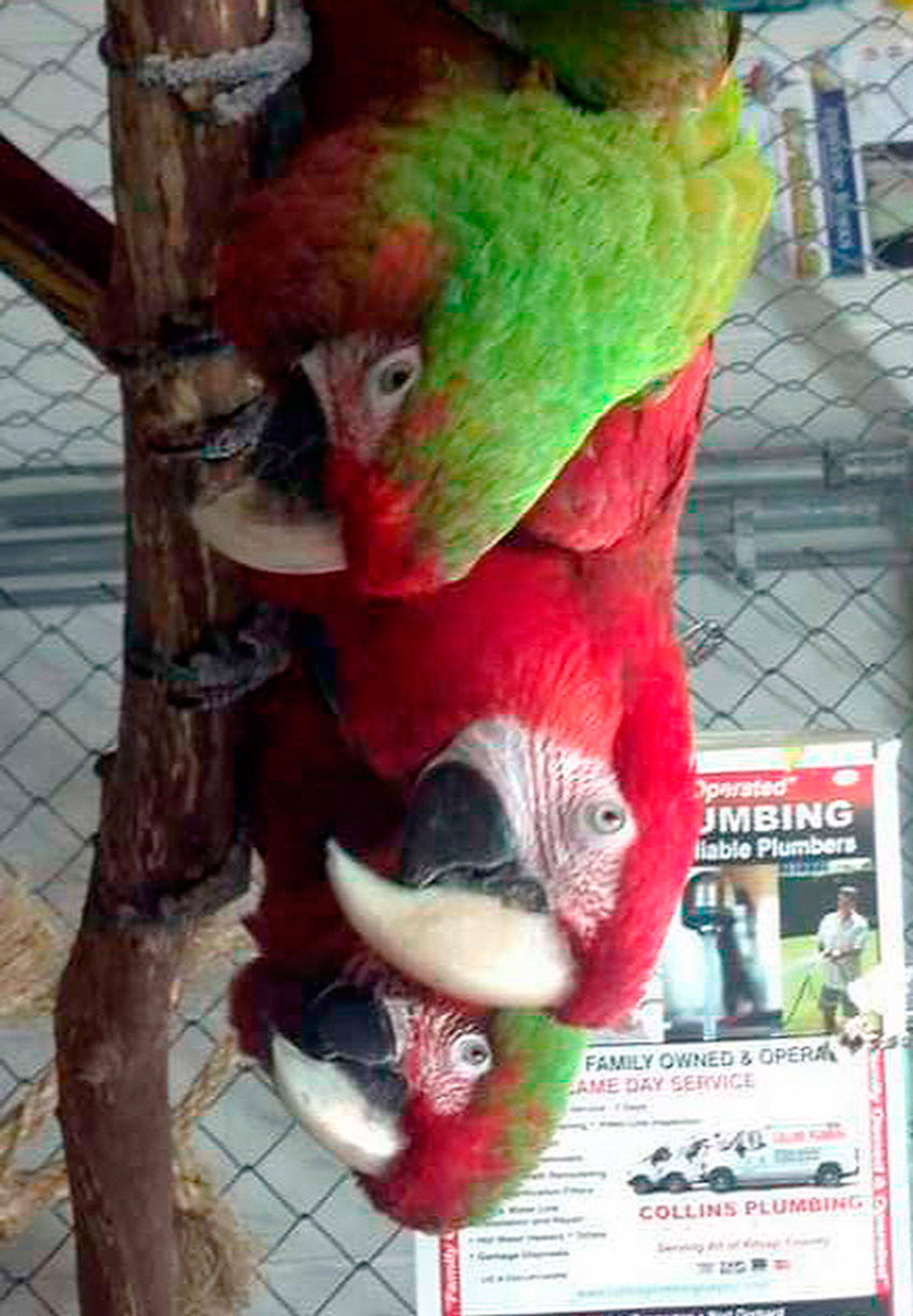They scream. They demand your attention. They want their food — right now. And sometimes, they can be an obnoxious pain in the neck.
Is your 2-year-old acting up today, you might say? That’s not the case with Sue Marshall of Poulsbo.
Instead of attending to a full-throated toddler every day, Marshall finds herself at the beck (or peck?) and call of a blue-and-gold macaw, a cockatoo and an African grey parrot. Each one is demanding in their own way.
But, despite it all, she loves every squeak, squeal and bark of her exotic birds and wouldn’t have it any other way. Marshall is the president of the Olympic Bird Fanciers club, a small Kitsap County hobbyist organization based in Port Orchard that has a booth at the Kitsap County Fair.
The group will once again be at the fair dispensing information and advice to bird owners and non-owners alike. The Olympic Bird Fanciers members typically have perhaps a half-dozen smaller exotic birds on display alongside two or three of the larger, more showy parrots that visitors expect to see: African greys, cockatoos and macaws, for example.
“We always have a nice educational booth with birds on display,” Marshall, who has been a club member for 15 years, said.
“We have educational materials to give to people. I think the really big factor is just the face-to-face conversations. People want to come to see the pretty birds, but we then get to talk about conservation, preservation and habitat.”
So why do bird fanciers commit to these high-maintenance, but beautiful creatures?
For Marshall, it’s all about these birds’ intelligence and individuality.
“They are very sentient beings,” she surmised. “They know of themselves compared to another bird. Most of our birds talk with at least a few words to express their needs, but not all of them do.”
Her blue-and-gold macaw named Esah, she said, “has a thing for water. She loves water and everything about it.”
If Esah sees someone pouring water, the macaw will start up a conversation about H2O — “They’re that intelligent,” she said.
Visitors to the Olympic Bird Fanciers often fall into two categories, Marshall said: those who own exotic birds and those who are considering becoming an owner. For either group, the club president said members at the booth can be a great resource.
Marshall said prospective owners need to get educated about what they’re taking on. She noted that owners should be able to financially care for a parrot; fresh food, housing, toys and veterinary care can be substantial burdens.
Even though birds may be small, they can cost about what it takes to care for a dog or cat.
“It’s our opportunity to make them aware of what [owning a parrot] really entails,” she said. “Do you really want that kind of noise? Do you want that kind of mess and commitment? They get to see and hear how noisy they are and how obnoxious they can be, and that’s all good.”
Despite those considerable caveats, Marshall said there’s a bird suitable for every lifestyle.
“There are birds that like lots of things going on around them. They like to interact with children. And then there are birds that really want a much more low-key lifestyle,” she said.
If you have a busy, active home life, Marshall recommended prospective bird owners investigate conures, who she feels are capable of handling lots of activity.
But one parrot species she advises people to avoid are cockatoos, which she believes shouldn’t be part of the pet trade.
“We don’t do a good job of taking care of their needs,” she said generally of bird owners. “[Cockatoos] are super intelligent — more intelligent than we can even begin to realize — so they need to be kept busy and challenged all the time.”
When feeling stressed or are unhappy, cockatoos will often pluck their own feathers or dig holes into their chests. “And they become really obnoxious,” Marshall said. “Parrot rescues are full of cockatoos and blue-and-gold macaws. It’s very difficult to meet their needs.”
The Olympic Bird Fanciers club’s main goal ultimately is to keep parrots and their 21 species out of rescue centers.
“We work hard with owners to solve behavioral problems their birds are having,” Marshall said. She said these birds can have a lifespan of from 20 to 30 years — and some of the larger parrots can live up to 80 years — and often will have had at least six homes during their lifetime.
But, as with a recalcitrant child, a parent could never imagine their life without the youngster. The same is true for bird owners, she said.
“Birds are just so funny. Each one is so unique. Some of them have a sense of humor, some of them are just so sweet and loving, and some are mean and ornery.”
The club’s booth is located between the miniature horses and cow barns at the fair.
For more information about the Olympic Bird Fanciers, visit their website at olympicbirdfanciers.com or on their Facebook page.



